/*
测试用的程序:
const a=10;
var b,c;
procedure p;
begin
c:=b+a
end;
begin
read(b);
while b#0 do
begin
call p;write(2*c);read(b);
end
end.
*/
#include
/*#include"pl0.h"*/
#include"string.h"
/*PL/0 编译系统 C 版本头文件 pl0.h*/
/*typedef enum{false,true}bool;*/
#define norw 13
#define txmax 100
#define nmax 14
#define al 10
#define amax 2047
#define levmax 3
#define cxmax 200
enum symbol{
nul,ident,number,plus,minus,times,slash,oddsym,eql,neq,lss,leq,gtr,geq,lparen,rparen,comma,
semicolon,period,
becomes,beginsym,endsym,ifsym,thensym,whilesym,writesym,readsym,dosym,callsym,const
sym,varsym,procsym,
};
#define symnum 32
enum object{
constant,
variable,
�
procedur,
};
enum fct{
lit,opr,lod,sto,cal,inte,jmp,jpc,
};
#define fctnum 8
struct instruction
{
enum fct f;
int l;
int a;
};
FILE* fas;
FILE* fa;
FILE* fa1;
FILE* fa2;
bool listswitch;
bool tableswitch;
char ch;
enum symbol sym;
char id[al+1];
int num;
int cc,ll;
int cx;
char line[81];
char a[al+1];
struct instruction code[cxmax];
char word[norw][al];
enum symbol wsym[norw];
enum symbol ssym[256];
char mnemonic[fctnum][5];
bool declbegsys[symnum];
bool statbegsys[symnum];
bool facbegsys[symnum];
struct tablestruct
{
char name[al];
enum object kind;
int val;
int level;
int adr;
�
int size;
};
struct tablestruct table[txmax];
FILE* fin;
FILE* fout;
char fname[al];
int err;
#define getsymdo if(-1==getsym())return -1
#define getchdo if(-1==getch())return -1
#define testdo(a,b,c) if(-1==test(a,b,c))return -1
#define gendo(a,b,c) if(-1==gen(a,b,c))return -1
#define expressiondo(a,b,c) if(-1==expression(a,b,c))return -1
#define factordo(a,b,c) if(-1==factor(a,b,c))return -1
#define termdo(a,b,c) if(-1==term(a,b,c))return -1
#define conditiondo(a,b,c) if(-1==condition(a,b,c))return -1
#define statementdo(a,b,c) if(-1==statement(a,b,c))return -1
#define constdeclarationdo(a,b,c) if(-1==constdeclaration(a,b,c))return -1
#define vardeclarationdo(a,b,c) if(-1==vardeclaration(a,b,c))return -1
void error(int n);
int getsym();
int getch();
void init();
int gen(enum fct x,int y,int z);
int test(bool* s1,bool* s2,int n);
int inset(int e,bool* s);
int addset(bool* sr,bool* s1,bool* s2,int n);
int subset(bool* sr,bool* s1,bool* s2,int n);
int mulset(bool* sr,bool* s1,bool* s2,int n);
int block(int lev,int tx,bool* fsys);
void interpret();
int factor(bool* fsys,int* ptx,int lev);
int term(bool* fsys,int* ptx,int lev);
int condition(bool* fsys,int* ptx,int lev);
int expression(bool* fsys,int* ptx,int lev);
int statement(bool* fsys,int* ptx,int lev);
void listcode(int cx0);
int vardeclaration(int* ptx,int lev,int* pdx);
int constdeclaration(int* ptx,int lev,int*pdx);
int position(char* idt,int tx);
void enter(enum object k,int* ptx,int lev,int* pdx);
int base(int l,int* s,int b);
�
#define stacksize 500
int main()
{
bool nxtlev[symnum];
printf("Input pl/0 file?");
scanf("%s",fname);
fin=fopen(fname,"r");
if(fin)
{
printf("List object code? (Y/N)");
scanf("%s",fname);
listswitch=(fname[0]=='y'||fname[0]=='Y');
printf("List symbol table?(Y/N)");
scanf("%s",fname);
tableswitch=(fname[0]=='y'||fname[0]=='Y');
fa1=fopen("fa1.tmp","w");
fprintf(fa1,"Input pl/0 file?");
fprintf(fa1,"%s\n",fname);
init();
err=0;
cc=cx=ll=0;
ch=' ';
if(-1!=getsym())
{
fa=fopen("fa.tmp","w");
fas=fopen("fas.tmp","w");
addset(nxtlev,declbegsys,statbegsys,symnum);
nxtlev[period]=true;
if(-1==block(0,0,nxtlev))
{
fclose(fa);
fclose(fa1);
fclose(fas);
fclose(fin);
printf("\n");
return 0;
}
fclose(fa);
�
fclose(fa1);
fclose(fas);
if(sym!=period)
{
error(9);
}
if(err==0)
{
fa2=fopen("fa2.tmp","w");
interpret();
fclose(fa2);
printf("Errors in pl/0 program");
}
else
{
}
}
fclose(fin);
}
else
{
printf("Can't open file!\n");
}
printf("\n");
return 0;
}
void init()
{
int i;
for(i=0;i<=255;i++)
{
ssym[i]=nul;
}
ssym['+']=plus;
ssym['-']=minus;
ssym['*']=times;
ssym['/']=slash;
ssym['(']=lparen;
ssym[')']=rparen;
ssym['=']=eql;
ssym[',']=comma;
ssym['.']=period;
ssym['#']=neq;
ssym[';']=semicolon;
�
strcpy(&(word[0][0]),"begin");
strcpy(&(word[1][0]),"call");
strcpy(&(word[2][0]),"const");
strcpy(&(word[3][0]),"do");
strcpy(&(word[4][0]),"end");
strcpy(&(word[5][0]),"if");
strcpy(&(word[6][0]),"odd");
strcpy(&(word[7][0]),"procedure");
strcpy(&(word[8][0]),"read");
strcpy(&(word[9][0]),"then");
strcpy(&(word[10][0]),"var");
strcpy(&(word[11][0]),"while");
strcpy(&(word[12][0]),"write");
wsym[0]=beginsym;
wsym[1]=callsym;
wsym[2]=constsym;
wsym[3]=dosym;
wsym[4]=endsym;
wsym[5]=ifsym;
wsym[6]=oddsym;
wsym[7]=procsym;
wsym[8]=readsym;
wsym[9]=thensym;
wsym[10]=varsym;
wsym[11]=whilesym;
wsym[12]=writesym;
strcpy(&(mnemonic[lit][0]),"lit");
strcpy(&(mnemonic[opr][0]),"opr");
strcpy(&(mnemonic[lod][0]),"lod");
strcpy(&(mnemonic[sto][0]),"sto");
strcpy(&(mnemonic[cal][0]),"cal");
strcpy(&(mnemonic[inte][0]),"int");
strcpy(&(mnemonic[jmp][0]),"jmp");
strcpy(&(mnemonic[jpc][0]),"jpc");
for(i=0;i
declbegsys[constsym]=true;
declbegsys[varsym]=true;
declbegsys[procsym]=true;
statbegsys[beginsym]=true;
statbegsys[callsym]=true;
statbegsys[ifsym]=true;
statbegsys[whilesym]=true;
facbegsys[ident]=true;
facbegsys[number]=true;
facbegsys[lparen]=true;
}
int inset(int e,bool *s)
{
return s[e];
}
int addset(bool *sr,bool *s1,bool *s2,int n)
{
int i;
for(i=0;i
}
return 0;
}
void error(int n)
{
char space[81];
memset(space,32,81);
space[cc-1]=0;
printf("****%s!%d\n",space,n);
fprintf(fa1,"****%s!%d\n",space,n);
err++;
}
int getch()
{
if(cc==ll)
{
if(feof(fin))
{
printf("program incomplete");
return -1;
}
ll=0;
cc=0;
printf("%d",cx);
fprintf(fa1,"%d",cx);
ch=' ';
while(ch!=10)
{
if(EOF==fscanf(fin,"%c",&ch))
{
line[ll]=0;
break;
}
printf("%c",ch);
fprintf(fa1,"%c",ch);
line[ll]=ch;
ll++;
}
�
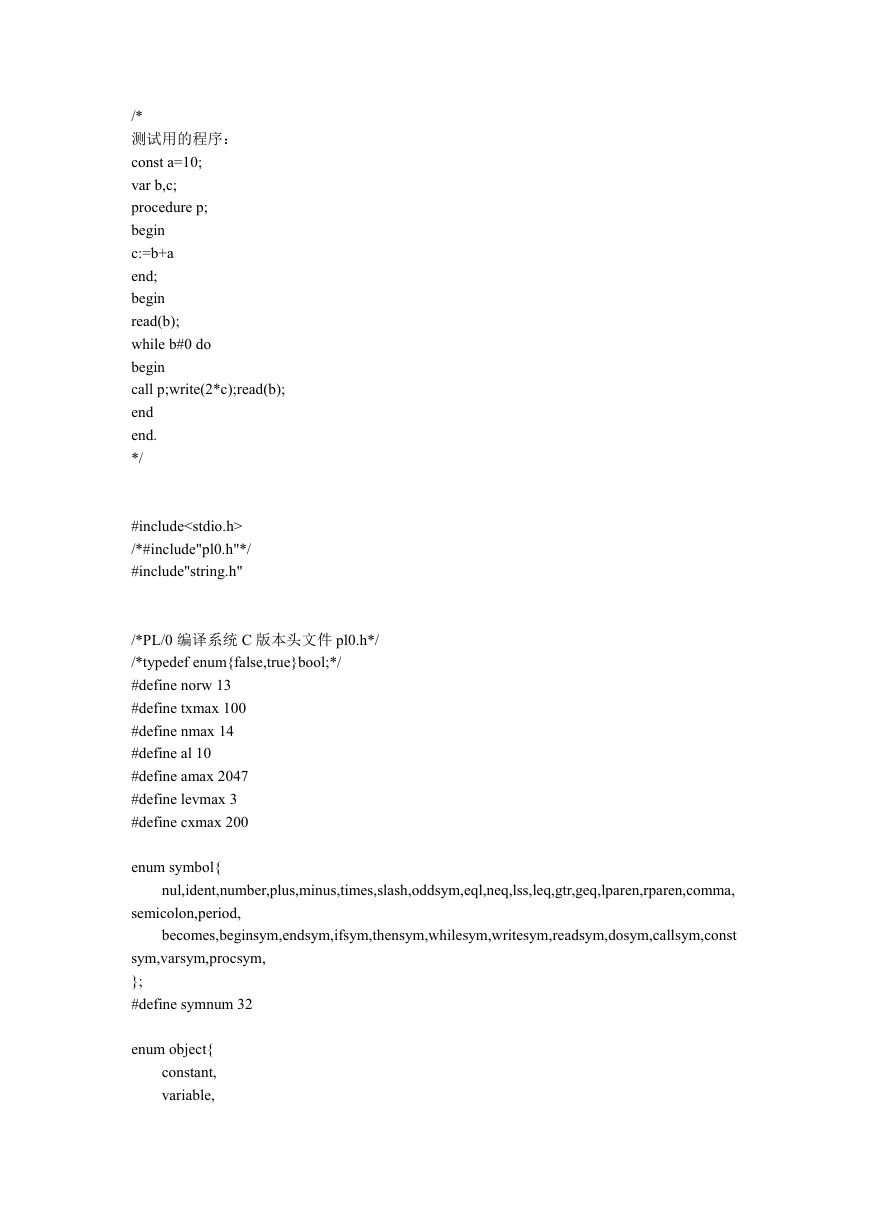
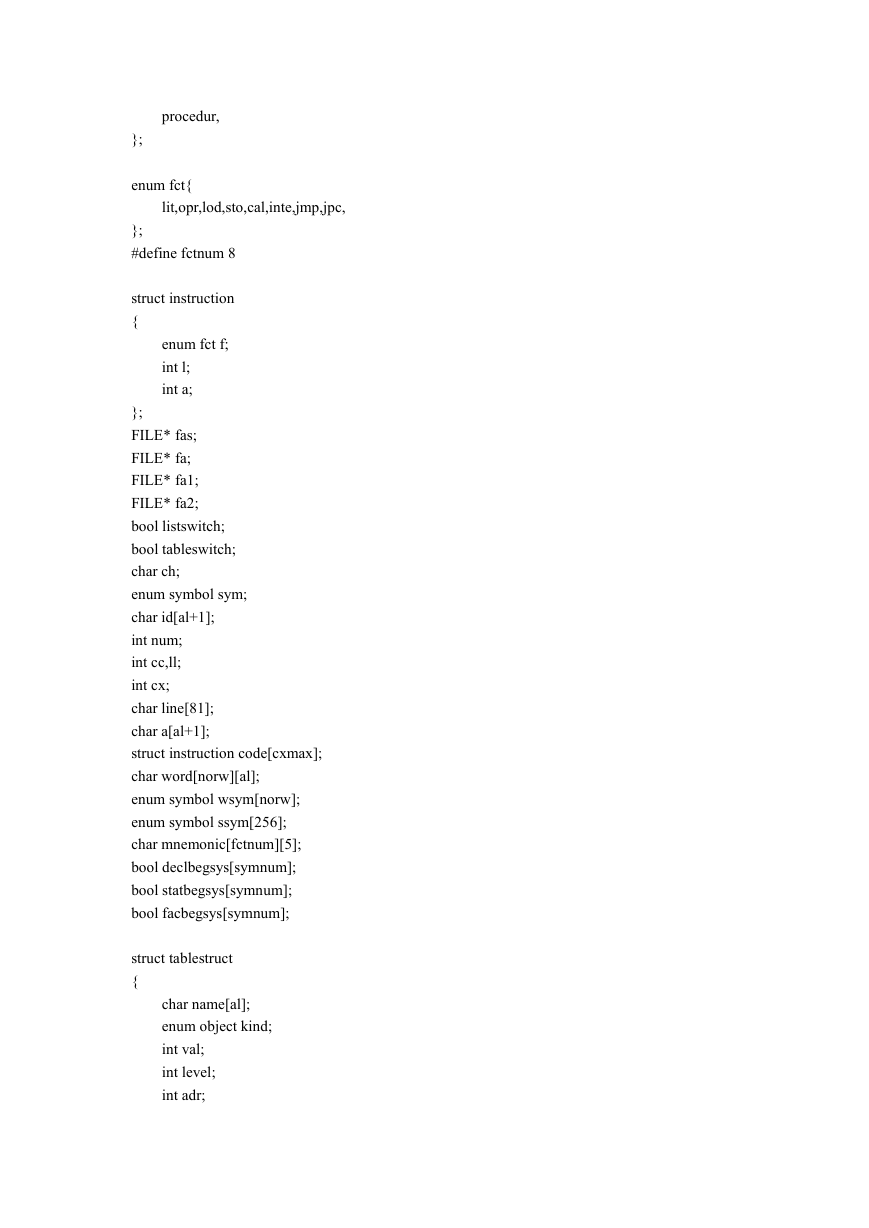
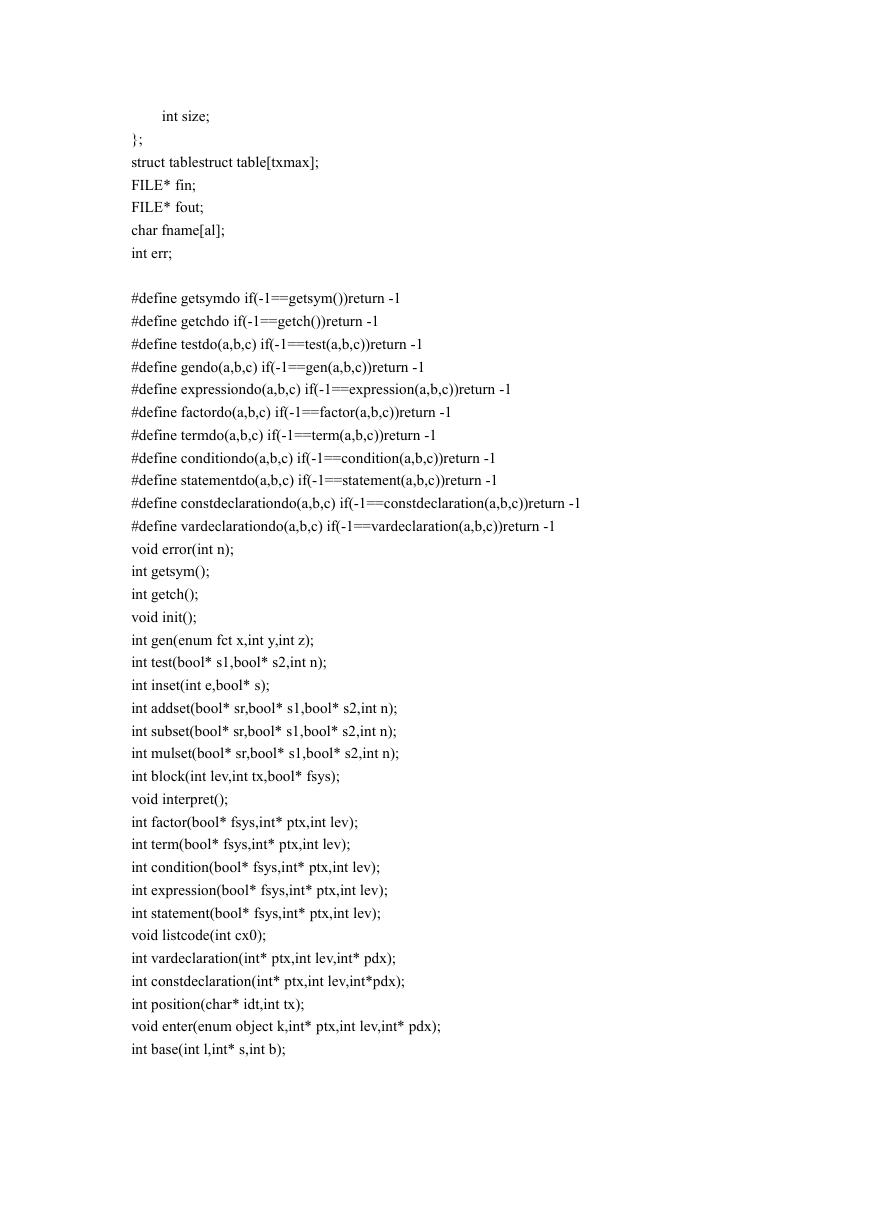
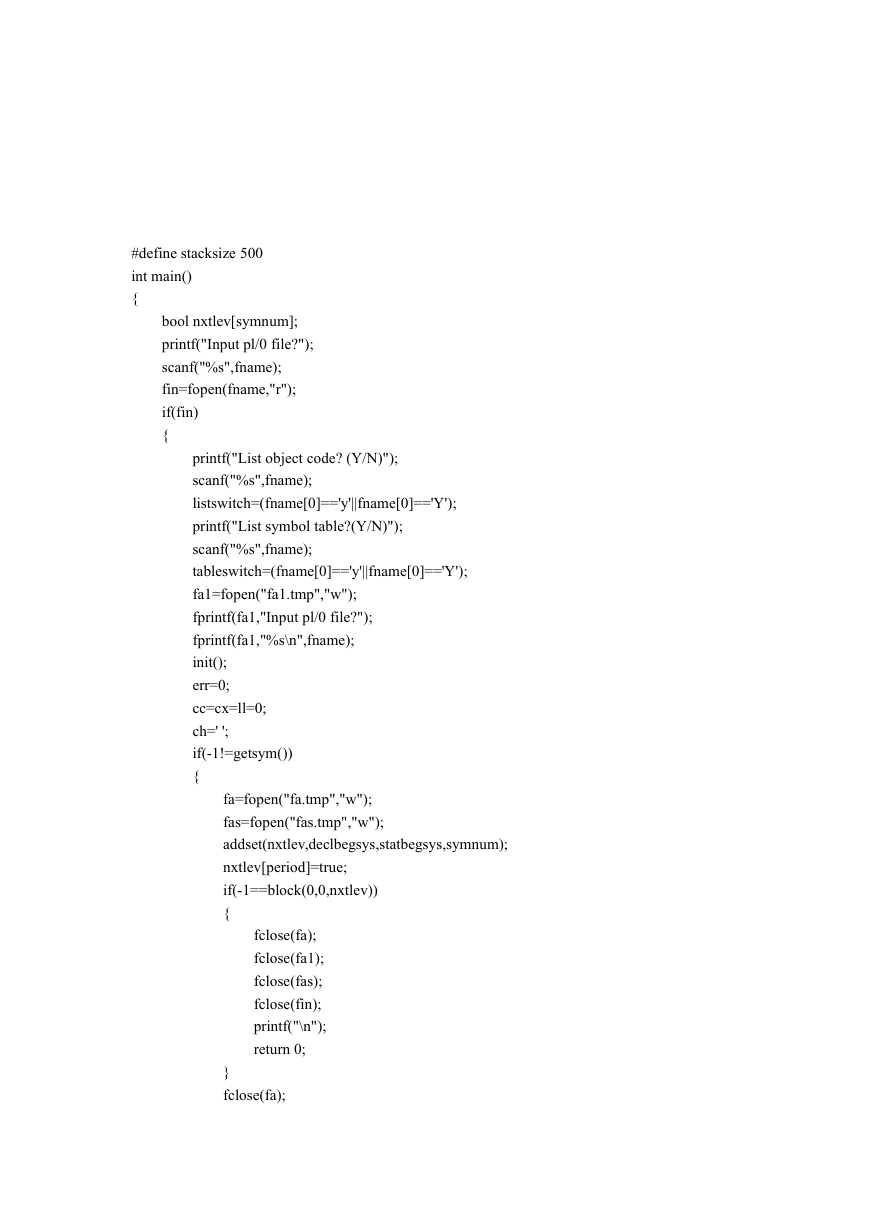
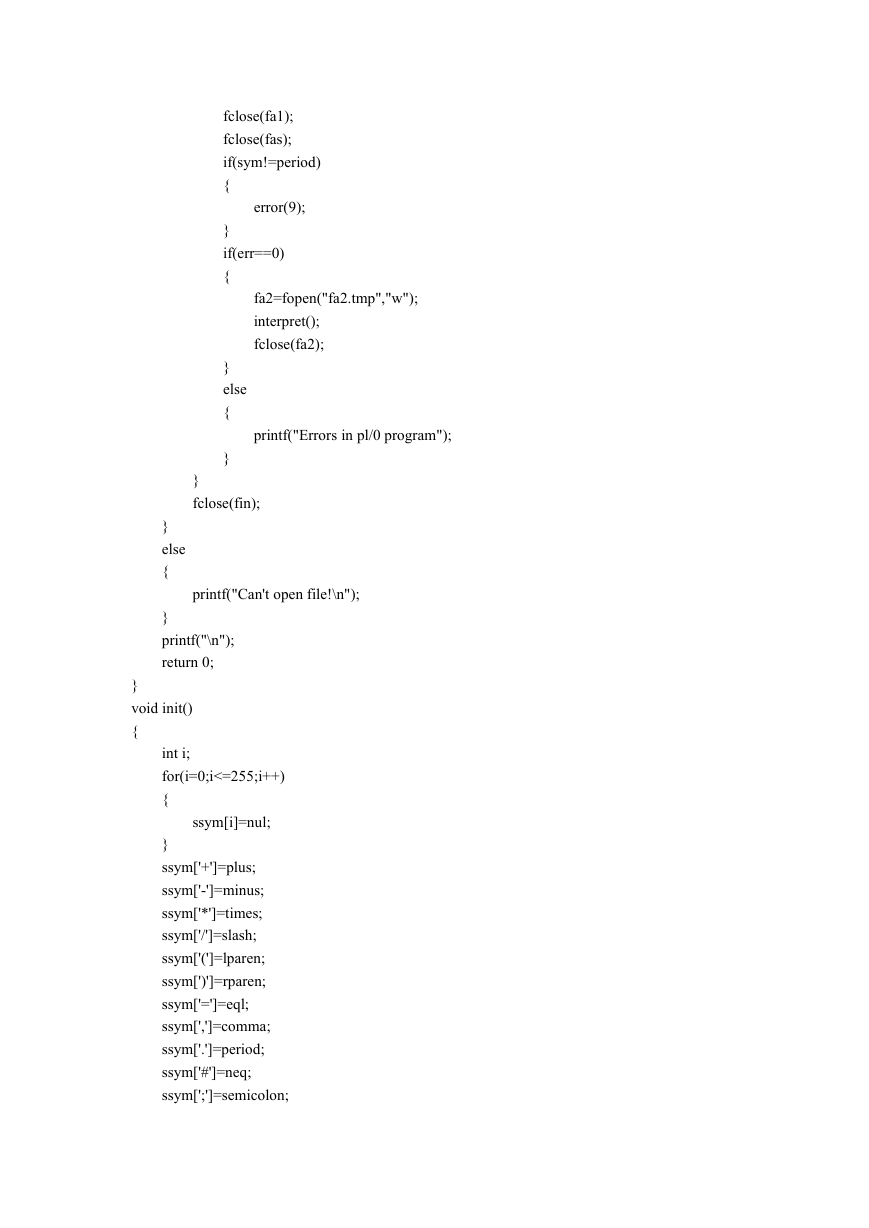
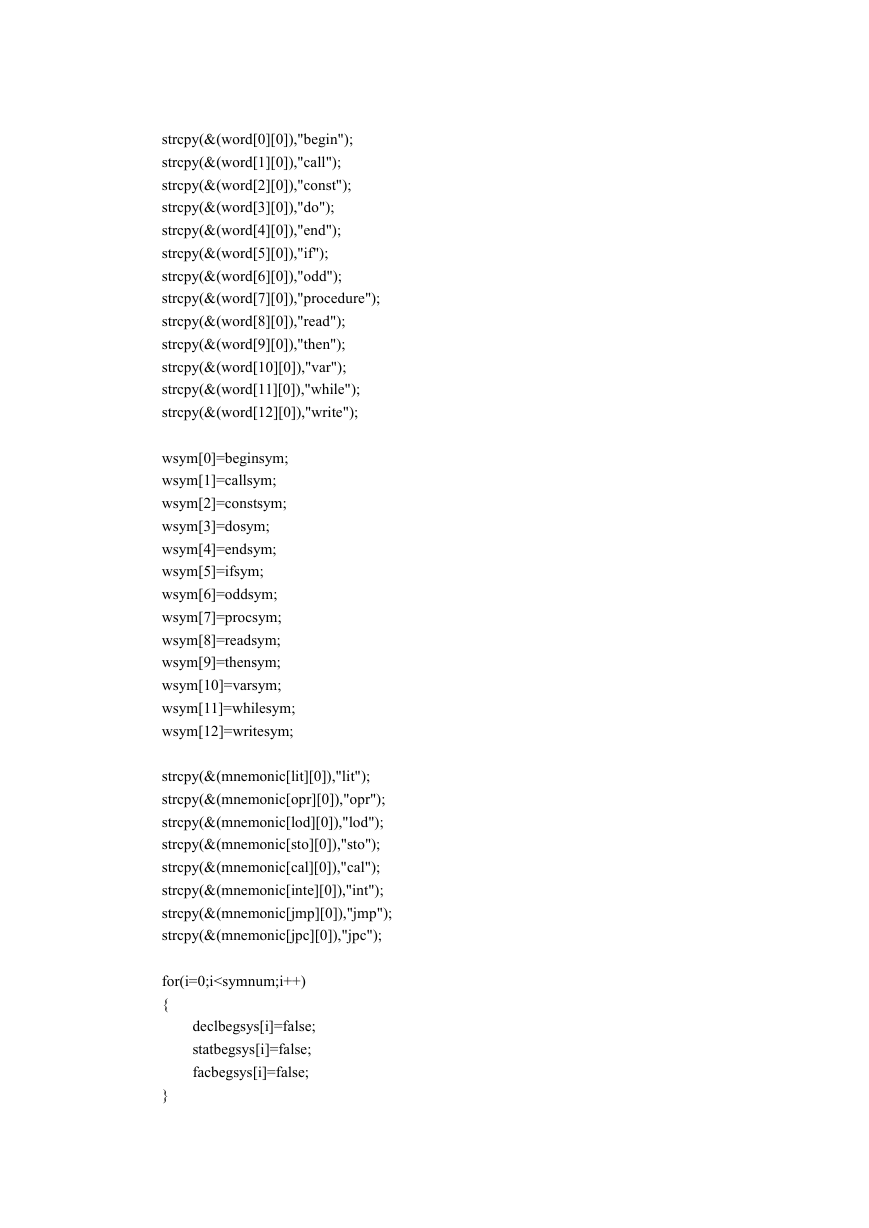
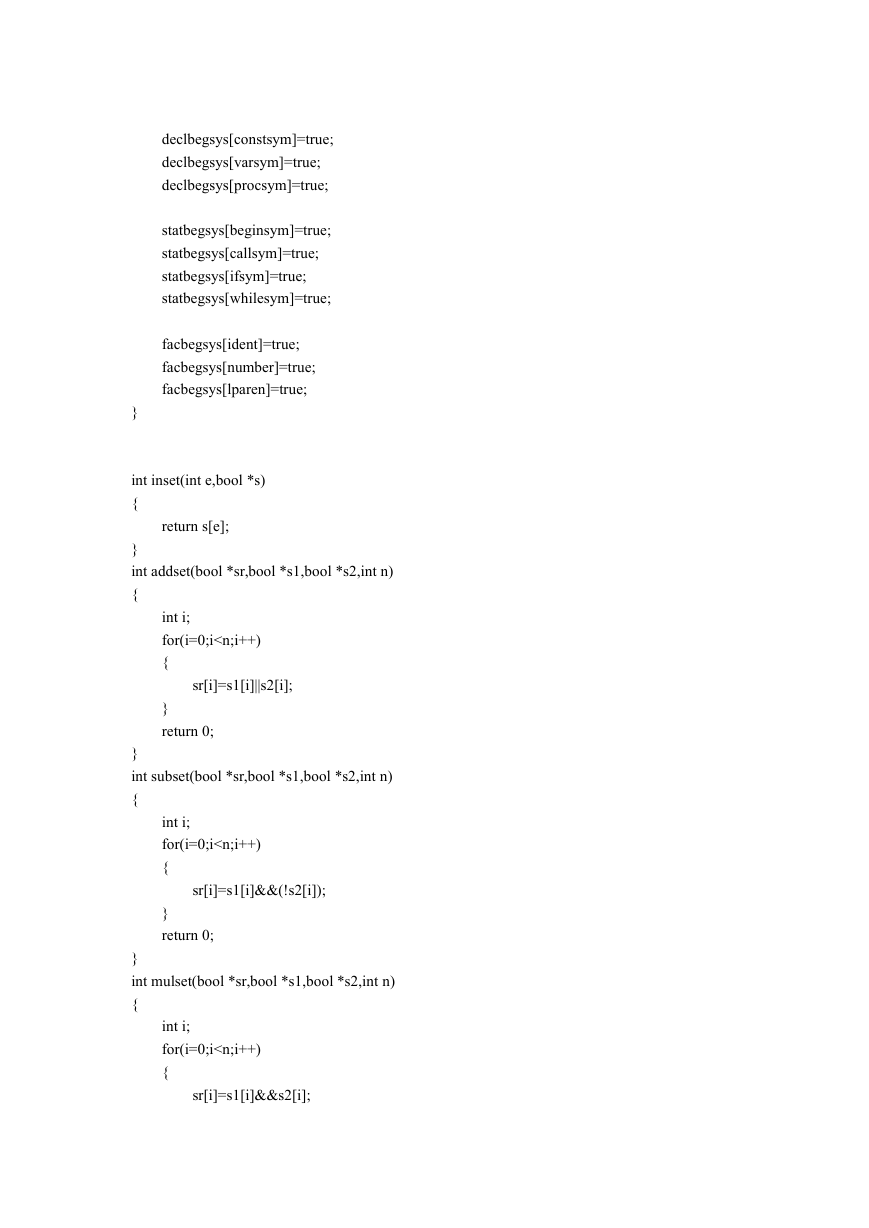
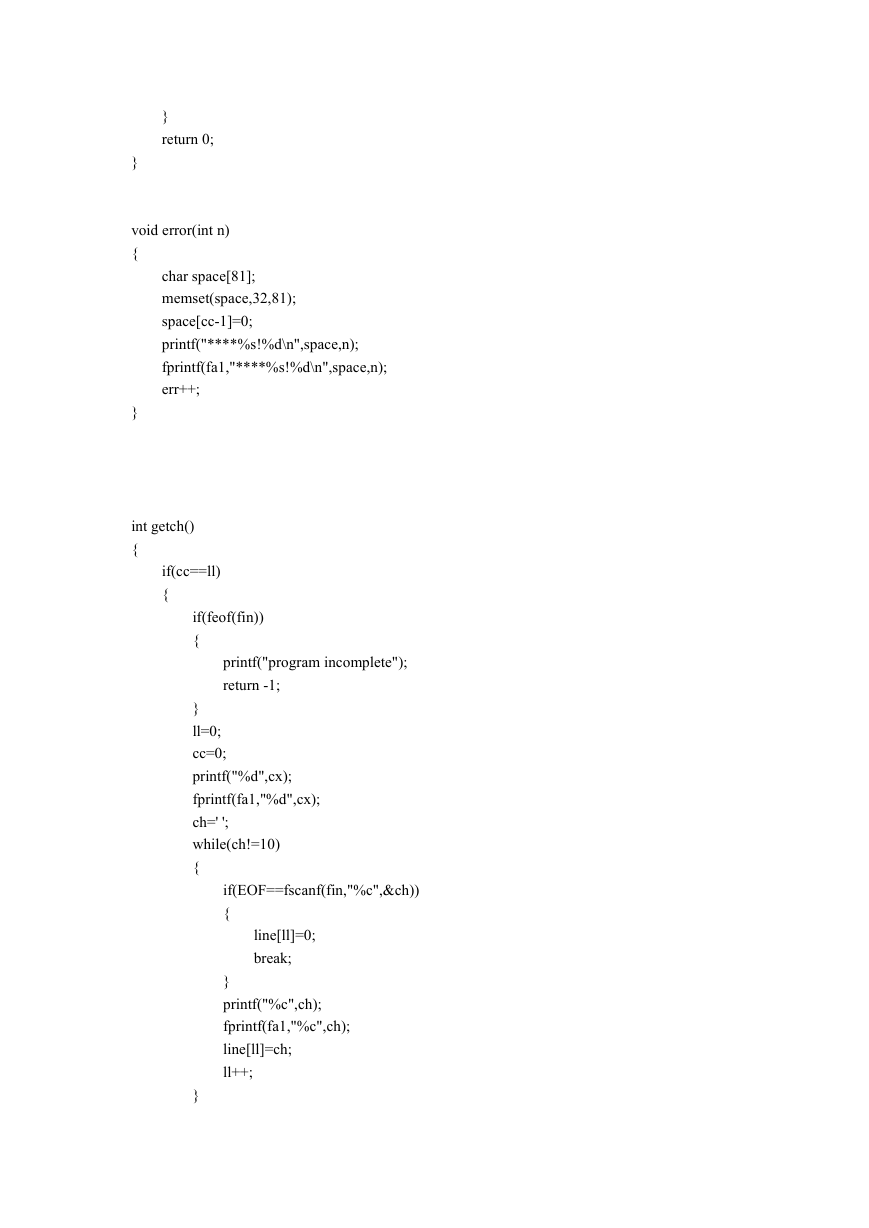








 2023年江西萍乡中考道德与法治真题及答案.doc
2023年江西萍乡中考道德与法治真题及答案.doc 2012年重庆南川中考生物真题及答案.doc
2012年重庆南川中考生物真题及答案.doc 2013年江西师范大学地理学综合及文艺理论基础考研真题.doc
2013年江西师范大学地理学综合及文艺理论基础考研真题.doc 2020年四川甘孜小升初语文真题及答案I卷.doc
2020年四川甘孜小升初语文真题及答案I卷.doc 2020年注册岩土工程师专业基础考试真题及答案.doc
2020年注册岩土工程师专业基础考试真题及答案.doc 2023-2024学年福建省厦门市九年级上学期数学月考试题及答案.doc
2023-2024学年福建省厦门市九年级上学期数学月考试题及答案.doc 2021-2022学年辽宁省沈阳市大东区九年级上学期语文期末试题及答案.doc
2021-2022学年辽宁省沈阳市大东区九年级上学期语文期末试题及答案.doc 2022-2023学年北京东城区初三第一学期物理期末试卷及答案.doc
2022-2023学年北京东城区初三第一学期物理期末试卷及答案.doc 2018上半年江西教师资格初中地理学科知识与教学能力真题及答案.doc
2018上半年江西教师资格初中地理学科知识与教学能力真题及答案.doc 2012年河北国家公务员申论考试真题及答案-省级.doc
2012年河北国家公务员申论考试真题及答案-省级.doc 2020-2021学年江苏省扬州市江都区邵樊片九年级上学期数学第一次质量检测试题及答案.doc
2020-2021学年江苏省扬州市江都区邵樊片九年级上学期数学第一次质量检测试题及答案.doc 2022下半年黑龙江教师资格证中学综合素质真题及答案.doc
2022下半年黑龙江教师资格证中学综合素质真题及答案.doc